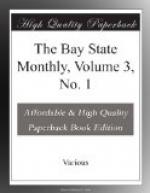In 1740, the same year that Whitefield visited New England, on his evangelistic mission, the crops were again cut off by untimely frosts, and Mr. Blake wrote in his annual entry-book: “There was this year an early frost that much Damnified y’e Indian Corn in y’e Field, and after it was Gathered a long Series of wett weather & a very hard frost vpon it, that damnified a great deal more.”
It is not unfair to suppose that the habits of rigid economy learned in this school of adversity influenced the passage of the celebrated law against wearing superfluities, quite as much as their austere prejudice against display. Be that as it may, the attention of the court was called to the dangerous increase of lace and other ornaments in female attire, and, after mature deliberation, it seemed wise to them to pass the following wholesome law:
“Whereas there is much complaint of the wearing of lace and other superflueties tending to little use, or benefit, but to the nourishing of pride, and exhausting men’s estates, and also of evil example to others; it is therefore ordered that henceforth no person whatsoever shall prsume to buy or sell within this jurisdiction any manner of lace to bee worne ore used within o’r limits.
“And no taylor or any other person, whatsoever shall hereafter set any lace or points vpon any garments, either linnen, woolen, or any other wearing cloathes whatsoever, and that no p’son hereafter shall be imployed in making any manner of lace, but such as they shall sell to such persons but such as shall and will transport the same out of this jurisdiction, who in such a case shall have liberty to buy and sell; and that hereafter no garment shall be made w’th short sleeves, whereby the nakedness of the arm may be discovered in the bareing thereof, and such as have garments already made w’th short sleeves shall not hereafter wear the same, unless they cover their armes with linnen or otherwise; and that hereafter no person whatsoever shall make any garment for women, or any of their




